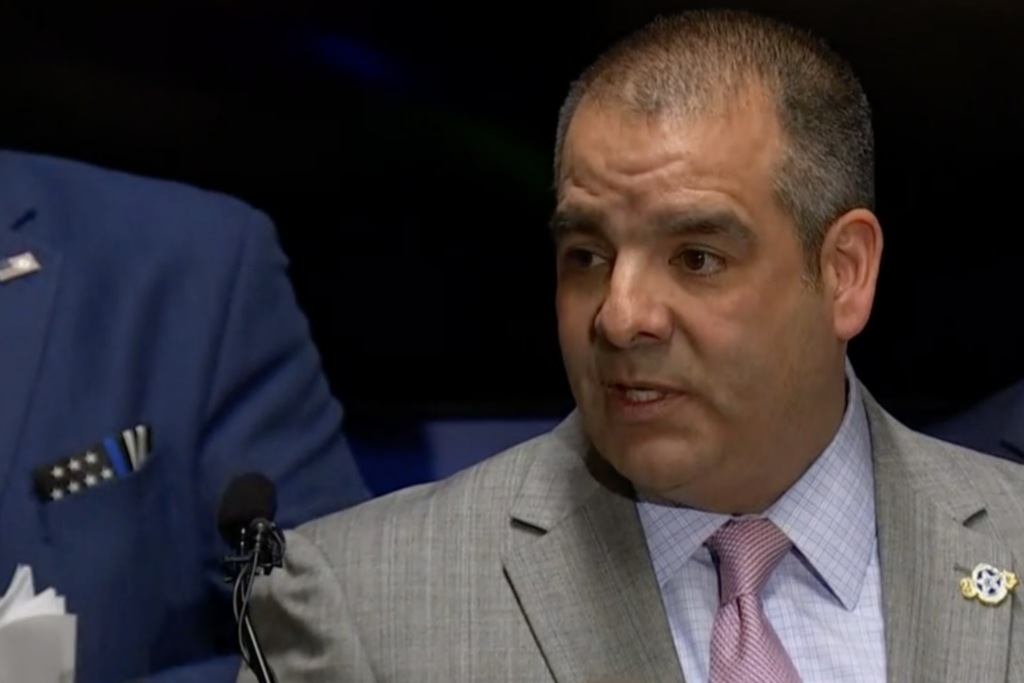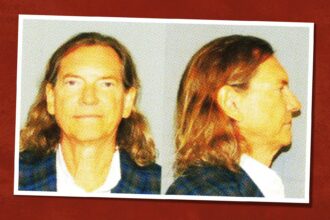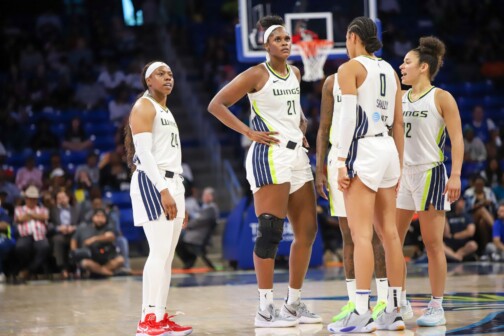Some members of the Dallas Community Police Oversight Board pushed back last week against Dallas Police Association president Mike Mata’s claims on a local talk radio show that they say disparaged the board.
Mata, the head of the police department’s largest union, made the statements on WBAP 820’s The Rick Roberts Show on August 3. On the conservative radio station’s website, the description of the discussion reads: “210 police officers shot in the line of duty so far this year, 46 of them ambushes. All the BLM and ‘hands up-don’t shoot’ nonsense, these stats are no surprise. Mike Mata, President of the Dallas Police Association, joined Rick Roberts to talk about this dangerous trend of hating on cops that doesn’t seem to be slowing down.”
On the show, Mata castigated the board for judging officers without understanding “what we do, nor have they taken any educational courses on our policy, our use of force continuum, or what our use of force (policies) are.” Mata also claimed that the board’s information on procedures and policy came from handouts.
Both board chair Jesuorobo Enobakhare and member Brandon Friedman disagreed with much of what Mata said on the show.
“Mr. Mata is definitely peddling false truths,” Enobackhare said.
Friedman posted a substantial Twitter thread refuting the DPA president’s claims. “Board members without armed public service experience are no less valuable than those who have it,” he wrote. “In many cases, their varied experiences make them more suited to overseeing armed public servants than if the Board were, say, all retired cops. I’m sorry Mr. Mata doesn’t get that.”
There appears to be a fundamental difference in how the president of the Dallas Police Association sees the objectives of the board and who empowers it versus what the board is actually tasked with doing, and who it answers to.
“When you listen to some of these hearings, it’s not about whether the officers follow policy, it’s not whether they followed the law,” Mata said in a phone call Friday. “It’s whether they’ve hurt somebody’s feelings and they felt like they could have been, you know, gentler or they could have been not understanding the situation that the officer was placed in. And there’s an avenue for that—it’s called internal affairs.”
The oversight board is made up of 15 members, each appointed by the City Council and the mayor. Currently, at least one member has law enforcement experience; Joe Rivas served six years with the Texas Rangers. (He was appointed by Councilman Adam Bazaldua, who represents South Dallas and Fair Park.)
“Dallas Police oversight board is responsible for essentially providing eyeballs on what the Dallas Police Department is doing and reviewing anything that may be out of policy or inappropriate, whether that is, you know, issues related to police brutality, shootings, or general misbehavior,” Friedman said. “But we also have an option for people to commend police officers for doing a good job.”
The board reviews resident complaints about policing, recommends policy changes, and can conduct independent investigations into complaints—something that was added to the board’s powers after the murder of Botham Jean by an off-duty officer in 2018.
Additionally, Council voted to hire a police oversight monitor, Tonya McClary, to head the Office of Community Police Oversight. She serves as a liaison between the police department and the oversight board, and can investigate any complaints that board determines merit further scrutiny. The body can also request that the city manager review any disciplinary action the police chief might take against officers.
The complaint process through the CPOB is not the same as the process for complaining to the Dallas Police Department’s internal affairs division or public integrity unit. Residents must file their complaints directly with CPOB. The board must hear every complaint it receives.
Unlike the department’s own internal review process, the CPOB’s review is resident-centered, and examines the interaction of that complainant and the officers he or she encountered.
Mata insisted Friday that he still sees value in the board.
“I was the one who helped set up this committee. I sat through all the meetings, I gave my stamp of approval and our association’s stamp of approval if they followed through on what they were supposed to do,” he said. “If you watch some of their meetings, they continuously ask for more investigative power and there’s no way in heck that we’re going to go for the more investigative power when they don’t take the responsibilities they have right now with the level of importance that we feel.”
But for the average officer, what is the line between asking questions about an incident and interrogation?
“Well, the No. 1 thing is, they shouldn’t be looking for any form of disciplinary power, period,” he said. “We already have disciplinary power. We have internal affairs, we have public integrity. We have a chief of police. They need to stick to what was agreed to in the city ordinance, and if they do that, then I will be partners with them. But they go outside of that. They try to do more than that.”
What seems to have brought Mata to the microphone at WBAP are statements made by Enobakhare and Friedman after the fatal shooting of Kyle Dail in July. Dail was shot by police while being detained on suspicion of selling drugs. On video, he produced a loaded handgun and tossed it while police were attempting to take him down inside a Lake Highlands convenience store.
Both men questioned the incident, with Enobakhare saying in a statement to the Dallas Morning News that he was “concerned about Mr. Dail being shot after he had thrown his weapon away” and that he wanted to know if there was any way for Dail to be apprehended without being shot. On Twitter, Friedman said, “I don’t understand why the cops approached the suspect that way. I *really* don’t understand why they shot him *after* he tossed the gun. And I also don’t understand why the video cuts off. Many questions.”
The statements by Friedman and Enobakhare, Mata said, are examples of why the rank-and-file officers feel the board won’t treat them fairly.
“If they want to see examples of what divides the community and the police, it’s statements like this made by the chairman and Mr. Friedman prior to knowing any of the facts of the police shooting—because I know the date that they were briefed and it was well after these statements,” Mata said. “How are officers supposed to believe in a committee chaired by people who already display these types of biases?”
Friedman said he was asking questions in his tweet. “I think I tweeted about it once and my tweet, I think it was phrased in the form of a question,” he said. “I stand by what I wrote.”
Mata says that officers resent having to explain themselves to a board that they feel doesn’t understand what it is like to be a police officer. He says that if the board wants the buy-in of the rank-and-file officers, they’re going to have to “be better educated.” Mata is calling for “40 hours of combined education before they hear their first complaint.” He wants ride alongs at least once a month and “more emphasis on being educated on police policy, tactics, and arrest powers.”
“There has to be something on paper that they’re required to meet this minimum standard of understanding four topics: Police procedures, arrest tactics, penal code, and arrest search and seizure,” Mata said.
Friedman said that he had taken at least four hours of training in use of force and that when he attended the training, at least three other board members were there. He also said the board was working to arrange more training in other aspects of police work. But he stressed that knowing what it feels like to be a police officer is not actually the board’s job. This is about public oversight of the police department.
“Mr. Mata is completely out of his depth and it’s entirely inappropriate,” Friedman said. “The board does not report to the Dallas Police Department, or the Dallas Police Association. They don’t determine our training requirements. Any training requirements of the board will be determined by the City Council and the mayor. That’s who we report to. That’s who we work for. In fact, to go step further, we work for the citizens of Dallas who are represented by the City Council and the mayor.”
To Friedman, whether anyone on the board has policing experience is irrelevant, because every person in the city is interacting with the police.
“The whole city has a vested interest in how this police department works—the police department affects everybody in Dallas, and everyone has an interest in its success or lack thereof,” he said. “And if we had a police oversight board made up solely of former police officers, it would not be as effective.”
Friedman compared it to congressional committees that have oversight of the military despite not every member having been in the military. He believes the board is effective because it’s made up of a cross-section of the city and doesn’t necessarily contain law enforcement officials. After all, police protect and serve the public, for which Council has directed the body to provide accountability.
“They’re more efficient, more effective when they have a large cross section of society, because there are multiple interests that every aspect of society has in the success of the police department,” Friedman said. “And police officers are—hopefully—good at being police officers, but it’s not necessarily their job to oversee police officers. People with different backgrounds are perhaps better suited for that. Which is to say, he’s way out of line saying that.”
Friedman said that officers appearing before the board should be like any other appearance they’re asked to make—be it a court appearance or a meeting with superiors.
“They should always feel like got a fair shake, we’re not trying to railroad anybody or be unfair. But we’re going to try to do the right thing,” he said. “People ask thoughtful questions—these are upstanding members of our community who are trying to do the right thing and make sure everybody gets a fair shake from the police officers to the residents who were dealing with the cops. I’d love to see one example that he could bring up where an officer wasn’t treated fairly.”
Ironically, if anyone felt that Mata’s statements to about the board on WBAP didn’t jibe with what his day job as a police sergeant requires, they could complain. If filed with the review board, the CPOB would be the body that reviews that complaint.
Author






